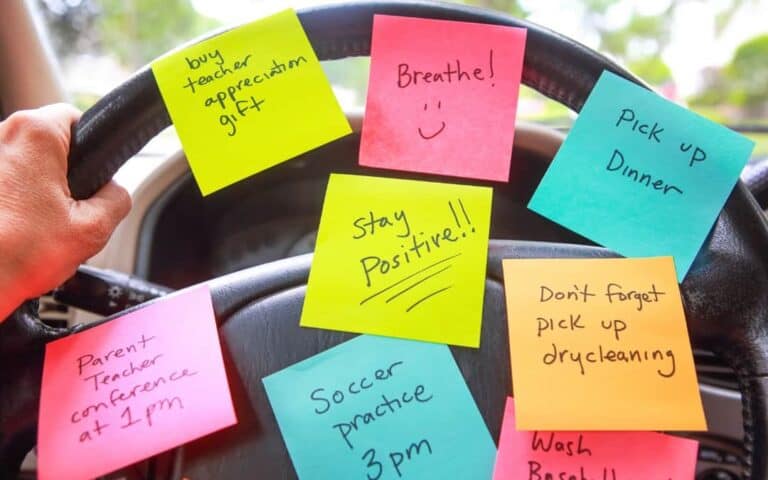How to Start Homeschooling
So, you’re thinking you want to start homeschooling your kids, huh? That’s a big decision, but, as a “seasoned” homeschool mom, I can tell you it’s worth it. No matter your motivation or reason to educate your child at home, these tips will help you learn how to start homeschooling.
I recognize that this decision may feel overwhelming at first, but know that after you have some experience under your belt, it will begin to feel like second nature. So take a deep breath and know that you can do this. It just feels scary because it is new.
Helpful Advice for How to Start Homeschooling
1) Figure Out a Consistent Schedule
I recommend setting out time each day for school or make a schedule. That way each morning at the same time your child knows it is school time. This will bring structure and organization to learning. If you decide on a field trip one day, that is no biggie; just try to stay on schedule as often as possible. Or take a day off during the week for a free day.
Make sure that your schedule fits your family’s natural rhythm. You’re not tied down to the standard 5-day-a-week school schedule, so you can create your own schedule. If afternoons and evenings are when everyone’s the most productive, that’s completely okay! If you would rather take your “weekend” on a weekday – no problem at all. If you’re finished the day’s assignments in just a few hours, take the rest of the day off. Everything is completely flexible to your family’s needs.
And be prepared to evaluate your schedule periodically to see if it still works for you.
RELATED POST: Tried-and-True Homeschool Schedules That Work
2) Connect with other homeschool families
See if you can find any homeschooled families in your area. When you get in the “inner circle”, you will find out other parents’ tips and tricks. They will also share resources with you, your children can have playdates, and you can do field trips together. It can give your child interactions with other kids and give you someone to talk to about your schooling.
One of the most important things that every homeschool family needs is a good support system. You can find your support from friends who homeschool, a local support group or co-op, or even online communities. Having connections with other people who understand the ins and outs of homeschooling can help you through those initial bumps in the road.
3) Discover your child’s learning style
Everyone has their own unique learning style and the beauty of homeschooling is that you can cater to your child’s education to take full advantage of your child’s strength. Take a look at what time of day your child is the most focused and responsive. See how they react to different teaching styles and what types of activities keep their attention. This will help you to determine what curriculum will work best for your family.
You can learn more about the different types of learning styles in THIS POST (and discover what type of activities work best for each learning style).

4) Set up a homeschool space
Lots of families designate a specific area in their home for school. Even if it has to be the kitchen table, just make sure you have all your supplies close when school begins. This will make it feel more structured and your child will know it’s school time. If you have a room you can designate for school, that’s great. Maybe add some decorations, and give it a little bit of a classroom feel. THIS POST will inspire you (but don’t fall into the comparison trap as you drool).
5) Start slow
At the beginning of the school year (or even if you bring your child home from school mid-year), start slow. This will help you adjust and ease into home learning. Start with just one subject for the first week. Then add in a second subject, and so on. This will help your kids and you get in the groove.
RELATED POST: Helpful Tips for Homeschoolers Just Starting Out
6) Interact with others in the “real world”.
Don’t get so focused on “school” that you forget that all of life is a learning experience. Make sure you get out of your house and interact with others. Even if it’s just a trip to the library or grocery store. It is important for you and your child. They can be educational trips if you want. Just so your child learns to socialize with others.
7) Evaluate, evaluate and evaluate some more
Have regular conversations to see how things are going for your children and your family. Listen to their input and adjust your schedule or lesson plans to make your home learning easier for everyone. Remember, you’re not stuck with the schedule and techniques that you use to begin your homeschooling year. Make changes and adjustments based on what keeps everyone happy and excited about learning.
8) Learn from other experienced homeschool moms
Don’t feel like you are going where no mom has gone before. Tap into the wealth of experience from other homeschool moms, especially those who share online. Choose some favorite homeschool bloggers to follow. Or listen to homeschool podcasts. Sign up for email lists of those “gurus” you connect with most. And keep an eye out for digital conferences where you can glean wisdom from others with years of homeschool experience.
When figuring out how to start homeschooling, keep in mind that it’s an ongoing process to find what works for your unique situation. It will take some time and a little bit of work, but over time you’ll find a rhythm that works for your family.
Just be patient, be flexible, and keep trying new things!






